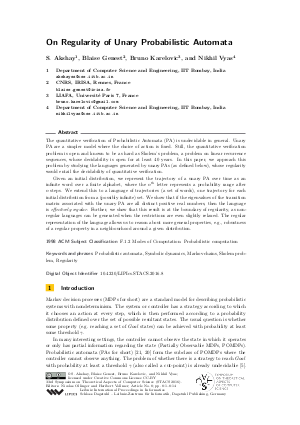On Regularity of Unary Probabilistic Automata
Authors S. Akshay, Blaise Genest, Bruno Karelovic, Nikhil Vyas
-
Part of:
Volume:
33rd Symposium on Theoretical Aspects of Computer Science (STACS 2016)
Part of: Series: Leibniz International Proceedings in Informatics (LIPIcs)
Part of: Conference: Symposium on Theoretical Aspects of Computer Science (STACS) - License:
 Creative Commons Attribution 3.0 Unported license
Creative Commons Attribution 3.0 Unported license
- Publication Date: 2016-02-16
File

PDF
LIPIcs.STACS.2016.8.pdf
- Filesize: 0.66 MB
- 14 pages
Document Identifiers
Subject Classification
Keywords
- Probabilistic automata
- Symbolic dynamics
- Markov chains
- Skolem problem
- Regularity
Metrics
- Access Statistics
-
Total Accesses (updated on a weekly basis)
0Document
0Metadata
Abstract
The quantitative verification of Probabilistic Automata (PA) is undecidable in general. Unary PA are a simpler model where the choice of action is fixed. Still, the quantitative verification problem is open and known to be as hard as Skolem's problem, a problem on linear recurrence sequences, whose decidability is open for at least 40 years. In this paper, we approach this problem by studying the languages generated by unary PAs (as defined below), whose regularity would entail the decidability of quantitative verification. Given an initial distribution, we represent the trajectory of a unary PA over time as an infinite word over a finite alphabet, where the n-th letter represents a probability range after n steps. We extend this to a language of trajectories (a set of words), one trajectory for each initial distribution from a (possibly infinite) set. We show that if the eigenvalues of the transition matrix associated with the unary PA are all distinct positive real numbers, then the language is effectively regular. Further, we show that this result is at the boundary of regularity, as non-regular languages can be generated when the restrictions are even slightly relaxed. The regular representation of the language allows us to reason about more general properties, e.g., robustness of a regular property in a neighbourhood around a given distribution.
Cite As Get BibTex
S. Akshay, Blaise Genest, Bruno Karelovic, and Nikhil Vyas. On Regularity of Unary Probabilistic Automata. In 33rd Symposium on Theoretical Aspects of Computer Science (STACS 2016). Leibniz International Proceedings in Informatics (LIPIcs), Volume 47, pp. 8:1-8:14, Schloss Dagstuhl – Leibniz-Zentrum für Informatik (2016)
https://doi.org/10.4230/LIPIcs.STACS.2016.8
BibTex
@InProceedings{akshay_et_al:LIPIcs.STACS.2016.8,
author = {Akshay, S. and Genest, Blaise and Karelovic, Bruno and Vyas, Nikhil},
title = {{On Regularity of Unary Probabilistic Automata}},
booktitle = {33rd Symposium on Theoretical Aspects of Computer Science (STACS 2016)},
pages = {8:1--8:14},
series = {Leibniz International Proceedings in Informatics (LIPIcs)},
ISBN = {978-3-95977-001-9},
ISSN = {1868-8969},
year = {2016},
volume = {47},
editor = {Ollinger, Nicolas and Vollmer, Heribert},
publisher = {Schloss Dagstuhl -- Leibniz-Zentrum f{\"u}r Informatik},
address = {Dagstuhl, Germany},
URL = {https://drops.dagstuhl.de/entities/document/10.4230/LIPIcs.STACS.2016.8},
URN = {urn:nbn:de:0030-drops-57093},
doi = {10.4230/LIPIcs.STACS.2016.8},
annote = {Keywords: Probabilistic automata, Symbolic dynamics, Markov chains, Skolem problem, Regularity}
}
Author Details
References
-
M. Agrawal, S. Akshay, B. Genest, and P. S. Thiagarajan. Approximate verification of the symbolic dynamics of Markov chains. In LICS, pages 55-64. IEEE Computer Society, 2012.

-
M. Agrawal, S. Akshay, B. Genest, and P. S. Thiagarajan. Approximate verification of the symbolic dynamics of Markov chains. J.ACM, 62(1):183-235, 2015.

-
S. Akshay, T. Antonopoulos, J. Ouaknine, and J. Worrell. Reachability problems for Markov chains. Information Processing Letters, 115(2):155-158, 2015.

- S. Akshay, B. Genest, B. Karelovic, and N. Vyas. On regularity of unary probabilistic automata. Technical report available online at http://perso.crans.org/~genest/AGKV16.pdf, 2015.
-
Alberto Bertoni. The solution of problems relative to probabilistic automata in the frame of the formal languages theory. In GI Jahrestagung, pages 107-112, 1974.

-
R. Chadha, Dileep Kini, and M. Viswanathan. Decidable Problems for Unary PFAs. In QEST, pages 329-344. LNCS 8657, 2014.

-
K. Chatterjee and M. Tracol. Decidable Problems for Probabilistic Automata on Infinite Words. In LICS, pages 185-194. IEEE Computer Society, 2012.

-
N. Fijalkow, H. Gimbert, and Y. Ouahladj. Deciding the Value 1 Problem for Probabilistic Leaktight Automata. In LICS, pages 295-304. IEEE Computer Society, 2012.

-
H. Gimbert and Y. Ouahladj. Probabilistic Automata on Finite Words: Decidable and Undecidable Problems. In ICALP, pages 527-538. LNCS 6199, 2010.

-
V. Halava, T. Harju, and M. Hirvensalo. Positivity of second order linear recurrent sequences. Discrete Applied Mathematics, 154(3), 2006.

-
V. A. Korthikanti, M. Viswanathan, G. Agha, and Y. Kwon. Reasoning about MDPs as transformers of probability distributions. In QEST, p. 199-208. IEEE, 2010.

-
C. Lech. A note on recurring series. Ark. Mat., 2, 1953.

-
O. Madani, S. Hanks, and A. Condon. On the undecidability of probabilistic planning and related stochastic optimization problems. Artificial Intelligence, 147(1-2):5-34, 2003.

-
K. Mahler. Eine arithmetische Eigenschaft der Taylor-koeffizienten rationaler Funktionen. Proc. Akad. Wet. Amsterdam, 38, 1935.

-
L. Maruthi, I. Tkachev, A. Carta, E. Cinquemani, P. Hersen, G. Batt., and A. Abate. Towards real-time control of gene expression at the single cell level: a stochastic control approach. In CMSB, pages 155-172. LNCS/LNBI, 2014.

-
J. Ouaknine and J. Worrell. Decision problems for linear recurrence sequences. In RP, pages 21-28, 2012.

-
J. Ouaknine and J. Worrell. On the Positivity Problem for simple linear recurrence sequences. In ICALP, pages 318-329. LNCS 8573, 2014.

-
J. Ouaknine and J. Worrell. Positivity problems for low-order linear recurrence sequences. In SODA, pages 366-379. ACM-SIAM, 2014.

-
J. Ouaknine and J. Worrell. Ultimate Positivity is decidable for simple linear recurrence sequences. In ICALP, pages 330-341. LNCS 8573, 2014.

-
Azaria Paz. Introduction to Probabilistic Automata. Academic Press, 1971.

-
Michael O. Rabin. Probabilistic automata. Information and Control, 6(3):230-245, 1963.

-
P. Turakainen. On Stochastic Languages. Information and Control, 12:304-313, 1968.

